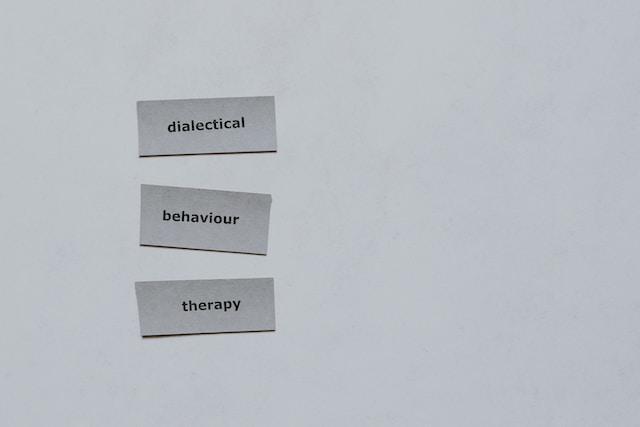Empowering Individuals Via Effective Dialectical Behavior Treatment (DBT) Solutions: Structure Stronger Mental Health Foundations
In the world of psychological health and wellness and health, the relevance of empowering individuals with reliable Dialectical Behaviour Treatment (DBT) solutions can not be overstated. By focusing on the core concepts of DBT, such as boosting psychological policy abilities, boosting interpersonal efficiency, developing distress resistance techniques, and cultivating mindfulness methods, people can get started on a journey towards building more powerful psychological wellness structures. The impact of DBT exceeds simple signs and symptom monitoring; it offers an alternative technique that outfits people with the tools needed to navigate life's challenges with durability and self-awareness. As we check out the transformative possibility of DBT in encouraging people to lead even more meeting lives, the course to enhanced mental health and well-being becomes a compelling narrative that beckons exploration.
Recognizing the Core Principles of DBT
To realize the essence of Dialectical Behavior Treatment (DBT), it is vital to understand the foundational concepts that underpin this restorative approach. DBT incorporates conventional cognitive-behavioral techniques with principles of distress acceptance, mindfulness, and resistance. The key goal of DBT is to aid individuals construct a life worth living by balancing modification with acceptance. This balance is attained with the dialectical philosophy, which highlights the assimilation of relatively contrary concepts like acceptance and adjustment.
One core principle of DBT is validation. An additional basic facet is dialectics, which teaches people to view situations from multiple perspectives and find the synthesis between conflicting ideas or feelings.
In addition, the principle of dialectical abstaining is main to DBT. This concept motivates people to abstain from self-destructive behaviors while also accepting themselves. By understanding and incorporating these core concepts, therapists can effectively carry out DBT methods and support individuals in their trip in the direction of psychological guideline and mental well-being.
Enhancing Emotional Law Abilities
Establishing proficiency in managing feelings is a basic element of promoting psychological health and social efficiency. Enhancing emotional law abilities is a core component of Dialectical Behaviour Treatment (DBT) that gears up individuals with the devices to navigate extreme feelings in a healthy and positive fashion. With DBT, individuals find out to determine, understand, and control their emotions, bring about enhanced mental wellness outcomes.
DBT stresses the value of mindfulness, which involves existing in the moment without judgment. This method allows people to observe their emotions without ending up being overwhelmed by them, improving their ability to react effectively instead than react impulsively. By cultivating mindfulness, people can establish a better sense of self-awareness and psychological control.

Improving Interpersonal Performance
Having actually developed a solid foundation in emotional regulation abilities within the structure of Dialectical Practices Treatment (DBT), the focus now changes in the direction of boosting interpersonal efficiency. Improving interpersonal performance is an essential component of DBT as it outfits people with the needed skills to navigate social communications, interact properly, established borders, and develop healthier connections.
In DBT, interpersonal performance abilities are instructed through components that concentrate on areas such as assertiveness, reliable interaction, and interpersonal analytic - DBT London. By discovering these skills, people can improve their ability to share their requirements and desires, keep self-respect, and construct stronger links with others


Building Distress Tolerance Techniques
Exploring reliable approaches for taking care of psychological distress is necessary for people seeking to improve their coping skills and resilience. Structure distress resistance methods is an essential aspect of Dialectical Practices Treatment (DBT) that equips individuals to browse tough emotions without becoming overloaded. One basic method in DBT for distress tolerance is the phrase "APPROVES," which stands for Tasks, Adding, Comparisons, Feelings, Pressing away, Thoughts, and Experiences. By using these techniques, individuals can properly manage upsetting scenarios and manage their psychological actions.
In addition, mindfulness practices play a substantial duty in structure distress resistance. Mindfulness encourages people to stay existing in the minute without judgment, allowing them to observe their ideas and emotions without reacting impulsively. This recognition allows people to endure distress much more effectively and establish a better feeling of control over their reactions.
Along with these techniques, producing a tailored distress tolerance plan with the advice of a trained therapist can give people with a tailored method to taking care of psychological distress. By incorporating these methods right into day-to-day live, individuals can strengthen their mental health and wellness structures and boost their overall well-being.
Cultivating Mindfulness Practices
To strengthen their distress resistance methods better, people can focus on cultivating mindfulness practices as a complementary method within the framework of Dialectical Behavior Treatment (DBT) Mindfulness, a crucial part of DBT, entails focusing helpful site on the here and now moment without judgment. DBT London. By fostering mindfulness, individuals can improve their recognition of ideas, feelings, and physical experiences, advertising a much deeper understanding of themselves and their experiences
Mindfulness techniques in DBT consist of strategies such as conscious breathing, body scans, and observing ideas without accessory. These methods motivate individuals to establish a non-reactive stance towards their inner experiences, allowing them to reply to challenging circumstances with higher clearness and composure. By integrating mindfulness into daily routines, people can find out to control their this post emotions more effectively, reduce spontaneous habits, and cultivate a feeling of internal peace.
Through growing mindfulness techniques, individuals undergoing DBT can develop a strong structure for taking care of anxiety, improving relationships, and improving total wellness. By integrating mindfulness right into their restorative journey, people can establish valuable abilities that empower them to browse life's difficulties with resilience and self-awareness.
Verdict
In final thought, reliable Dialectical Behavior Therapy (DBT) solutions play an important role in equipping individuals to construct stronger mental wellness structures. By understanding the core concepts of DBT, enhancing psychological regulation abilities, improving social performance, developing distress resistance methods, and growing mindfulness practices, people are equipped with the required devices to navigate their feelings, partnerships, and challenges in a much more adaptive and durable way. DBT solutions offer a detailed strategy to promoting mental health and empowering individuals to lead satisfying lives.
By concentrating on the core principles of DBT, such as enhancing emotional law skills, improving social effectiveness, building distress tolerance methods, and growing mindfulness practices, individuals can begin on a trip in the direction of structure stronger mental health foundations. Enhancing psychological guideline abilities is a core component of Dialectical Behavior Therapy (DBT) that furnishes people with the devices to navigate intense emotions in a constructive and healthy way.In addition, DBT instructs functional abilities such as distress tolerance and emotion regulation methods to help individuals handle tough emotions.To deepen their distress tolerance methods better, people can concentrate on cultivating mindfulness methods as a corresponding strategy within the structure of Dialectical Practices Treatment (DBT) By recognizing the core concepts of DBT, improving emotional policy skills, improving social performance, building distress resistance strategies, and growing mindfulness techniques, people are view publisher site furnished with the needed tools to navigate their feelings, partnerships, and difficulties in a more durable and adaptive manner.
Comments on “Experience Development and Renewal with DBT London's Competence”